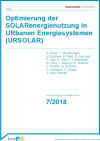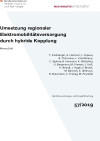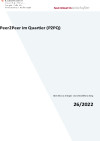Suchergebnisse für "Factsheet: Energietechnologien gestalten, die für alle sinnvoll und nutzbar sind"
DDM Feldkirchen
Demonstration von Digitalisierungsmaßnahmen in Wärmenetzen am Beispiel von Fernwärmenetz Feldkirchen.
P2PQ - Peer2Peer im Quartier
Das Projekt Peer2Peer im Quartier befasst sich mit der konkreten Umsetzung von Anwendungen zu Photovoltaik-Eigenverbrauchsoptimierung sowie Peer-to-Peer-Beziehungen auf Basis der Blockchain-Technologie in Quartieren und deren Validierung im Echtbetrieb.
Smart Energy Systems / SESWA - Award
Im Rahmen der Smart Energy Systems Week wird der "Smart Energy Systems Award“ in vier Kategorien vergeben und zeichnet neben herausragenden wissenschaftlichen Arbeiten und Forschungsprojekten auch konkrete Demonstrationsvorhaben und Start Ups aus.
Optimierung der SOLARenergienutzung in URbanen Energiesystemen (URSOLAR)

URSOLAR stellt EntscheidungsträgerInnen eine Roadmap zur integrierten urbanen Solarenergie-nutzung zur Verfügung. Es wird aufgezeigt, wie Photovoltaik (PV) und Solarthermie angepasst an infrastrukturelle und rechtliche Gegebenheiten in idealtypischen Stadtquartieren aus ökonomischer, ökologischer und sozialer Sicht sowie unter Berücksichtig von Stakeholder-Interessen optimal ge-nutzt werden können.
Schriftenreihe
7/2018
A. Posch, T. Brudermann, M. Buchner, E. Fleiß, D. Geringer, P. Hart, S. Hatzl, T. Kallsperger, G. Lang, T. Mayrold, E. Meißner, C. Reischl, G. Schnedl, S. Seebauer, K. Stöger, A. Würz-Stalder
Herausgeber: BMVIT
Deutsch, 137 Seiten
Downloads zur Publikation
Umsetzung regionaler Elektromobilitätsversorgung durch hybride Kopplung (Move2Grid)

Aufbauend auf den Ergebnissen der „Stadt der Zukunft“ Sondierungsprojekte „Smart Exergy Leoben“, und „Energieschwamm Bruck“ soll im gegenständlichen,umsetzungsorientierten Forschungsvorhaben anhand des Beispiels Leoben untersucht werden, wie mit regionalen, erneuerbaren Ressourcen regionale Elektromobilität langfristig versorgt, optimal ins kommunale Verteilernetzsystem integriert und ökonomisch nachhaltig implementiert werden kann.
Schriftenreihe
57/2019
T. Kienberger, A. Hammer, J. Vopava, B. Thormann, L. Kriechbaum, C. Sejkora, R. Hermann, K. Watschka, U. Bergmann, M. Frewein, J. Koß, H. Brandl, J. Vogel, S. Moser, M. Baresch, K. de Bruyn, R. Braunstein, C. Freitag, M. Peyreder
Herausgeber: BMVIT
Deutsch, 172 Seiten
Downloads zur Publikation
P2PQ - Peer2Peer im Quartier

Das Projekt Peer2Peer im Quartier befasst sich mit der konkreten Umsetzung von Anwendungen zu Photovoltaik-Eigenverbrauchsoptimierung sowie Peer-to-Peer-Beziehungen auf Basis der Blockchain-Technologie in Quartieren und deren Validierung im Echtbetrieb.
Schriftenreihe
26/2022
Herausgeber: BMK
Deutsch, 43 Seiten
Downloads zur Publikation
50 green houses - Development and demonstration of a low-tech façade greening system
Development of a cost-efficient all-in façade greening system („Greening-Toolkit“) including a maintenance concept, involving all trades and processes, for a broad (facing roads) implementation on facades in the urban built environment, combined with a process innovation for simplification of all necessary coordination processes.
RENOWAVE.AT - The innovation lab for sustainable, climate-neutral renovation of buildings and districts
RENOWAVE.AT will act as a central contact point for collaboration in innovation projects and provide systematic and early access to as well as promote innovative, scalable renovation concepts and sustainable renovation technologies within real development environments (open innovation principle).
Repair & Do-It-Yourself Urbanism (R&DIY-U)
The project follows the aim to analyze and to strengthen the transformative potential of Repair & Do-It-Yourself Urbanism with regard to a fundamental change of the existing poor sustainable handling of commodities in selected urban districts, their infrastructures and dominant business and private household practices into resilient areas.
greening UP! Sustainable green maintenance, maintenance, maintenance of vertical greenery including legal aspects
Based on extensive surveys and analyses of existing vertical building greenery in outdoor areas (floor and system-bound façade greening) and vertical interior greenery, the project developed tailor-made green care, maintenance and repair concepts and addresses legal aspects. The "greening UP!" Knowledge pool with concrete recommendations and clearly presented findings as well as the conception of a digital tool for the "First Green Aid" complete the project.
UrbanEnergyCells - Requirements for the implementation of energy cells in future energy system designs
The transformation of the currently hierarchical electricity system into a renewable, decentralized electricity system poses major challenges for the actors in the energy industry and society. Most of the installed decentralized renewable energy sources are installed in rural areas, due to easier legal implementation and shorter decision-making pathways. However, the energy density in urban areas is significantly higher, resulting in a transport of electrical energy to the consumption centers.
LivingMODELofTomorrow
Development of transparent, technical and economic models for medium and high volume residential buildings, with special focus on the non-profit sector. Topics such as generation living, teleworking as well as smart homes are developed in an integrated model, for dense structures as well as pavillons and townhouses. All models follow the three pillars of sustainability.
StromBIZ - demonstration projects: business models for decentralized electricity generation and distribution
Feasible business models to utilize locally generated renewable energy are expected to induce a tipping point for the "Energy Turnaround" in Austria. Within the proposed project a number of demonstration PV plants on residential and non-residential buildings had been realized. On this basis new approaches of business cases had been developed, implemented, tested and disseminated.
Urban MoVe - Private law contracts as innovative instruments for city and mobility planning.
The research project Urban MoVe investigated to what extent private-law contracts (e.g. mobility contracts, funds, urban development contracts) are suitable as municipal planning and steering instruments for mobility at residential locations based on best practice analyzes and implemented national practical examples.
Smart Services for resource optimized energy systems in urban districts
The concept of a smart city explicitly refers to a sustainable city development. To apply smart city concepts in practice, it is essential to develop practice- and profit-oriented business models (smart services), which at the same time generate social and ecological benefits. Smart services were developed for the application in three specific city development areas and their practicability was verified in a comprehensive stakeholder process with decision makers.
ÖKO-OPT-QUART - Economically optimized control and operating mode of complex energy networks of future city districts
In the project ÖKO-OPT-QUART energy-based, economic and control-orientated models will be developed in order to simulate the operating mode of complex, sustainable energy networks in city districts. For an exemplary configuration these models will be combined to an overall model which allows a realistic economic comparison of different control strategies. The final goal of the project is the development of a method for the systematic design of cost-optimized, predictive control strategies for complex energy networks in city districts.
INFINITE: INnovative FINancing models for sustaInable urban energy sysTEms
The goal of the INFINITE-project is to lay the foundations for a more wide-spread implementation of urban energy supply systems across buildings, using renewable energy sources produced in local supply units. At the same time the projects supports to reduce the demand for fossil fuels and higher-level energy infrastructure.
Villab – Exploration of a Villach innovation laboratory for the cooperative development of sustainable neighbourhoods
The "Villab - Probe" project serves to check the feasibility of an urban innovation laboratory to accelerate the transformation of Villach districts towards climate neutrality. Assuming positive feasibility, the cooperation with relevant stakeholders will be deepened and a business plan drawn up for a future innovation laboratory.
PV4residents – Innovative Finance Service and Business Model for PV Power Plants of Multiple Dwellings with On-site Use of Electricity
The aim is to develop a business model, which enables a stronger penetration of PV plants on multiple dwellings with self-consumption of produced electricity by the residents. Involvement of the municipality allows to deliver surplus electricity for their needs. Basis of the business model is an analysis of the technical, legal, administrative, user related and economic barriers with participation of stakeholders and to identify best practice solutions.
Move2Grid – Implementation of regional energy-supply-concepts by hybrid coupling
Based on the results of the national-funded exploratory projects called “Smart Exergy Leoben”, and “Energy Sponge Bruck”, the present implementation project aims at analysing how local, renewable resources support the supply of electric mobility in Leoben in the long term and to integrate it into the municipal distribution grid in a good economic sense.
